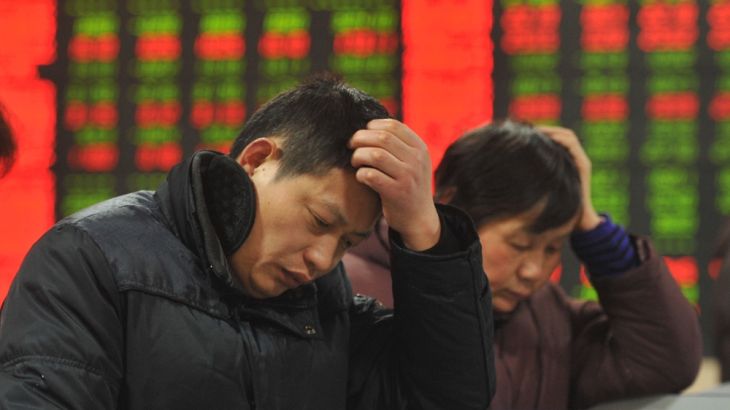
What’s behind China’s stock market meltdown?
We examine the global panic surrounding China’s economy and what can be done to keep it going.
For the second time in a week stocks have fallen on China’s stock exchanges, causing an emergency shutdown and intensifying concerns about the health of the world’s second largest economy.
Trading was frozen on both the Shanghai and the Shenzhen stock exchanges on Monday and Thursday after stocks plunged by more than 7 percent.
Keep reading
list of 4 itemsOne of the biggest hurdles for athletes on the Olympic path: Money
Key takeaways from Xi Jinping’s Europe trip
When will EVs become mainstream in the US?
The drop, which is being linked to poor economic figures, tensions after North Korea’s nuclear test and the spat between the Arab world and Iran, comes amid further data showing that China’s economy is slowing down.
But what is heightening fears is that markets have continued to fall despite government intervention.
The feeze in trading, also known as a “circuit breaker” was introduced last summer after more than $3.2 trillion was wiped off China’s markets in three weeks – an amount more than 10 times the size of the entire Greek economy.
In theory the circuit breaker should curb volatility, but it seems this week’s losses may have been triggered by a depreciation in the Chinese currency, the Yuan.
Charles Horne, an economy portfolio manager with consultancy firm China Policy, joins Counting the Cost to discuss the currency devaluation and the general lack of confidence in the Chinese economy.
Saudi-Iran and the coming ‘Oil Wars’
Relations between Saudi Arabia and its regional rival Iran have reached an all-time low after Riyadh severed diplomatic ties with Tehran.
The escalation in tensions came just a few days after the kingdom controversially executed a prominent Shia cleric.
Regional heavyweights, both countries hold one-quarter of the world’s proven oil reserves, but have been battling over regional influence.
Mamdouh Salameh, an international oil economist and a World Bank consultant on energy, joins the programme to discuss the Saudi-Iran crisis and whether oil could become the frontline in a new Cold War.
Sri Lanka opens doors to foreign investors
Twenty-five years after a brutal civil war, Sri Lanka is beginning to see a big increase in tourism numbers.
In 2015, almost 1.8 million people came to the formerly troubled island, up nearly 18 percent on 2014.
Elected a year ago, the government is now trying to turn Sri Lanka into a destination for foreign investors – the most important being foreigners. Individuals and companies will now be allowed to own Sri Lankan land.
Anushka Wijesinha, the chief economist at the Ceylon Chamber of Commerce, joins the programme to discuss the new investment drive.